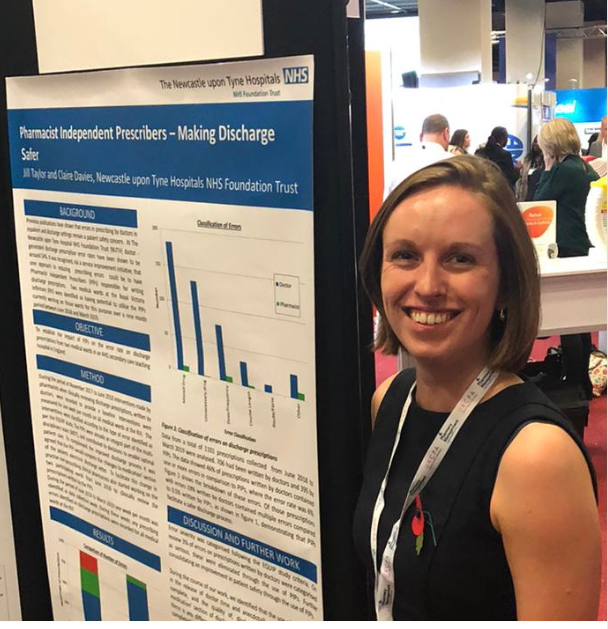
1) Welcome to a new #accredited (0.75h CE/#CME) #tweetorial on challenging case presentations for pts with #cardiometabolic disease, #CaReMe #FOAMed.
Our expert author is Claire Davies. @claireyrivs is a specialist diabetes & endocrinology #pharmacist working in Gateshead in 🇬🇧.
Our expert author is Claire Davies. @claireyrivs is a specialist diabetes & endocrinology #pharmacist working in Gateshead in 🇬🇧.

2) She is a member of UKCPA Diabetes & Endocrinology committee @UKCPADiabetes & works across #diabetes, #endocrinology, & emergency/acute care in Secondary Care. She is currently involved in development of regional guidelines & education to support medicines optimisation for PLWD
3a) This program is intended for healthcare professionals and is supported by an educational grant from Boehringer Ingelheim Pharmaceuticals Inc. and Eli Lilly Company.
3b) Past programs still eligible for credit can be found at ckd-ce.com. Faculty disclosures and accreditation statement are at ckd-ce.com/disclosures/.
4) Let’s start with a couple of polls to set the scene…
5a) How many people with T2DM have CV disease?
5b) Answer: c – a third. A third of people with T2DM have CV disease
🔓pubmed.ncbi.nlm.nih.gov/29884191/
🔓pubmed.ncbi.nlm.nih.gov/29884191/
6a) How many adults with diabetes have been diagnosed with CKD?
6b) Answer: c – 37% of adults with diabetes have been diagnosed with CKD
pubmed.ncbi.nlm.nih.gov/11587045/
pubmed.ncbi.nlm.nih.gov/11587045/
7) So it’s already clear #cardiovascular #renal & #metabolic conditions are interconnected & frequently co-exist, ➡️the #CaReMe approach, a collaboration among British Cardiovascular Society, The Renal Association, & Association of British Clinical Diabetologists (@ABCDiab) 

8) Let’s start with some cases to put this theory into practice. All cases are fictitious, any resemblance to real people is coincidental. Ready, set go…
9) Case 1 – 55 ♀️. Her past medical history includes #LVSD, #T2DM and #CVA, thus illustrating that link between conditions. 

10) Her medication history includes a basal-bolus #insulin regimen, #metformin, multiple antihypertensives.
You see this person in clinic, and that day her vitals are BP, 162/90, P 68, Height 167 cm (5'6"), Weight 81 kg (178 lbs).
You see this person in clinic, and that day her vitals are BP, 162/90, P 68, Height 167 cm (5'6"), Weight 81 kg (178 lbs).
11) Her latest HbA1c is 60mmol/mol (7.6%), stable. She has no oedema or SOB but describes hypoglycaemia awareness. Her #eGFR is 55.
What are priorities when treating her?
a. BP control
b. ⬇️risk of diabetes complications by⬇️HbA1c
c. Optimising HF treatment
d. All of the above
What are priorities when treating her?
a. BP control
b. ⬇️risk of diabetes complications by⬇️HbA1c
c. Optimising HF treatment
d. All of the above
12) The answer is all of the above, as these are all interlinked. So how do we choose a priority?
13) It's difficult, but it may be possible to tackle more than one aspect at once. Let’s consider her BP first. We
have multiple options:
👉Increase her #thiazide diuretic
👉Increase her #CCB
👉Increase her #Sacubitril_valsartan
have multiple options:
👉Increase her #thiazide diuretic
👉Increase her #CCB
👉Increase her #Sacubitril_valsartan
14a) Let’s take each of those options in turn:
👉⬆️Thiazides: rarely effective for BP at higher doses, so perhaps not be a good option as the pt has no oedema
👉⬆️ #CCB: potentially a good option but will only improve #BP & none of the other priorities
👉⬆️Thiazides: rarely effective for BP at higher doses, so perhaps not be a good option as the pt has no oedema
👉⬆️ #CCB: potentially a good option but will only improve #BP & none of the other priorities
14b)
👉⬆️#Sacubitril_valsartan: this could help her #BP and #HF – so is a better dual approach & a possibility
Another poll: What class of agents might you consider that might help all the priorities for this person?
👉⬆️#Sacubitril_valsartan: this could help her #BP and #HF – so is a better dual approach & a possibility
Another poll: What class of agents might you consider that might help all the priorities for this person?
15) #GLP-1 agonists & #SGLT2i's have shown proven benefit in #cardiovascular outcome trials (#CVOTs). Sulphonlyureas have not demonstrated this. Pioglitazone should be AVOIDED in people with HF as per MHRA/CHM alert (🔓gov.uk/drug-safety-up…). 

16) There's most support for a #flozin #SGLT2i, as these have shown to⬇️risk of #CV_death, #HHF, & improve #HF symptoms. In this pt, w/ eGFR >45ml/min, #SGLT2i will also improve glycaemic control.
It's time to #flozinate – both empagliflozin & dapagliflozin are licensed in #HFrEF
It's time to #flozinate – both empagliflozin & dapagliflozin are licensed in #HFrEF
17) @NICE NG28 recommends a #SGLT2 inhibitor with proven #CV benefit in anyone with chronic #HF or established #ASCVD.
See 🔓nice.org.uk/guidance/ng28
See 🔓nice.org.uk/guidance/ng28

18) But wait! There are a few things we need to do before we start an #SGLT2i.
19) We need to:
👉Assess #DKA risk
👉Address modifiable risk factors for DKA before starting a #flozin
This is because #SGLT2 inhibitors can cause euglycaemic #DKA so we have to ensure we start and use them appropriately and safely, as with any medication.
👉Assess #DKA risk
👉Address modifiable risk factors for DKA before starting a #flozin
This is because #SGLT2 inhibitors can cause euglycaemic #DKA so we have to ensure we start and use them appropriately and safely, as with any medication.

20) How do we assess #DKA risk & check if a person it is at increased risk, do you ask? Well, @NICEComms have some pointers:
👉Pt has had a previous episode of DKA
👉Pt is unwell with intercurrent illness
👉Pt is following a very low carbohydrate or #ketogenic diet
👉Pt has had a previous episode of DKA
👉Pt is unwell with intercurrent illness
👉Pt is following a very low carbohydrate or #ketogenic diet
21a) Let’s go in reverse here. How many carbohydrates is "low carbohydrate"? @NICEComms have helpfully specified – 20-50g/day of carbohydrate or less than 10% of a 2000kcal/day diet
21b) What’s a ketogenic diet?
A very low carbohydrate, high fat diet that is designed to induce ketosis.
These can put people at an ⬆️risk of DKA so need to be cautious if initiating an #SGLT2 inhibitor in these cohorts.
A very low carbohydrate, high fat diet that is designed to induce ketosis.
These can put people at an ⬆️risk of DKA so need to be cautious if initiating an #SGLT2 inhibitor in these cohorts.
21c) Why do we worry about intercurrent illness with #SGLT2i? Risks of dehydration & DKA risk, so pts on SGLT2i's should be advised to hold their SGLT2i temporarily & only restart 48 hours after symptoms have resolved #sickdayrules
🔓diabetesonthenet.com/wp-content/upl…
🔓diabetesonthenet.com/wp-content/upl…

22) OK, so we have established our pt is not on a ketogenic or low carb & she is not acutely unwell. Last thing: previous DKA.
I advise exploring the #diabetes history in general and other factors that may guide diabetes type. The patient explained the following:
I advise exploring the #diabetes history in general and other factors that may guide diabetes type. The patient explained the following:

23a) From this do you think a #SGLT2 inhibitor is safe in this person?
23b) Answer: No, this person has potentially had a previous DKA and therefore could have #T1D & not #T2D.
So what do we do next? Hold off starting a #flozin.
So what do we do next? Hold off starting a #flozin.
24) We could check antibodies/C-peptide to confirm diabetes diagnosis. For information on diabetes tests check out: diabetesgenes.org.uk
For this patient, we may need specialist input.
For this patient, we may need specialist input.

25) If a #T1DM diagnosis is confirmed, ensure the person is recoded, informed of the difference in diagnosis and unfortunately, she can’t have an #SGLT2i due to #DKA risk – unless on specialist advice that benefits outweigh risks, noting this is off-label.
26) Key Points from this case:
🔑SGLT2i's⬇️risk of CV death, #HHF, & HF sx so may be good agent for pts w/#T2D + #HF
🔑With #eGFR >45, SGLT2i's also confer glycaemic benefit
🗝️Before starting SGLT2i must✅DKA risk & discuss diet & sick day rules
🗝️ Care must be individualized
🔑SGLT2i's⬇️risk of CV death, #HHF, & HF sx so may be good agent for pts w/#T2D + #HF
🔑With #eGFR >45, SGLT2i's also confer glycaemic benefit
🗝️Before starting SGLT2i must✅DKA risk & discuss diet & sick day rules
🗝️ Care must be individualized
27a) That’s Case 1⃣ all wrapped up! Come back tomorrow for more!
For more information see:
👉Empagliflozin in HF NICE TA - nice.org.uk/guidance/ta773
👉Dapagliflozin in HF NICE TA - nice.org.uk/guidance/ta679
👉NICE NG28 Type 2 Diabetes in Adults - nice.org.uk/guidance/ng28
For more information see:
👉Empagliflozin in HF NICE TA - nice.org.uk/guidance/ta773
👉Dapagliflozin in HF NICE TA - nice.org.uk/guidance/ta679
👉NICE NG28 Type 2 Diabetes in Adults - nice.org.uk/guidance/ng28
27b) 👉Prescribing Tool for SGLT2 inhibitors - static-content.springer.com/esm/art%3A10.1…
29) 👏 @GoggleDocs @HannahBeba @drkevinfernando @AmarPut @drpatrickholmes @pcdsociety @GrahamStretch @SnayCardsPharmD @beaverspharmd @rpharms @EmilyJaneBond82 @PharmacistHF @PharmRJ @kamleshkhunti @nealcpatel @ParkeAileen @DianaMIsaacs @welshy_89
• • •
Missing some Tweet in this thread? You can try to
force a refresh









